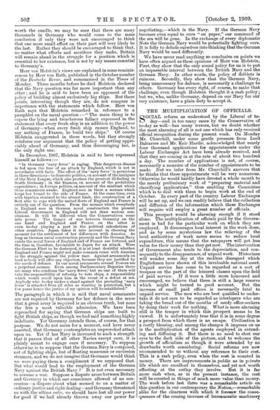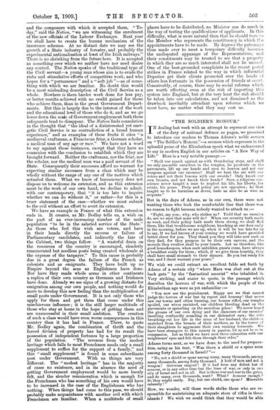Till MULTIPLICATION OF OFFICIALS.
Q OCIAL reform as understood by the Liberal of to- kJ day—and in too many cases by the Conservative of to-day as well—has many terrors, but we doubt whether the most alarming of all is not one which has only received official recognition during the present week. On Monday Mr. Churchill, under some gentle pressure from Lord Balearres and Mr. Keir Hardie, acknowledged that nearly four thousand applications for appointments under the labour Exchanges Act have been already received, and that they are coming in at the rate of about two hundred a day. The number of applications is not, of course, necessarily a measure of the number of appointments to be made. But we infer from Mr. Churchill's answers that he thinks that these appointments will be very numerous. Otherwise he would hardly have devoted a whole month to the merely preliminary work of "preparing material and classifying applications," thus enabling the Committee which is to deal with them to begin work at the end of October. In every part of the country Labour Exchanges will be set up, and we can readily believe that the collection and diffusion of the information which these Exchanges will require will employ a great number of officials.
This prospect would be alarming enough if it stood alone. The multiplication of officials paid by the Govern- ment is bad for the particular work on which they are employed. It discourages local interest in the work done, and as by some mysterious law the relieving of the local authorities of work never seems to reduce local expenditure, this means that the ratepayers will get less value for their money than they get now. The intervention of Government also tends to the depreciation, and con- sequently to the disappearance, of unpaid work. Historians will wonder some day at the reckless disregard which Englishmen have shown of this invaluable national asset. Unpaid service has come to be regarded as a sort of trespass on the part of the leisured classes upon the field of paid service. If it were a little more honoured and encouraged, we believe that there is still a large reserve which might be turned to good Recount. But the increase of small paid offices is necessarily fatal to unpaid service. The men who are best qualified to under- take it do not care to be regarded as interlopers who are taking the bread out of the mouths of needy office-seekers by doing their work for nothing. What is more alarming still is the temper in which this prospect seems to be viewed. It is unfortunately true that it is in some degree a prospect from which there is no escape. Civilisation is a costly blessing, and among the charges it imposes on us is the multiplication of the agents employed in extend- ing and diffusing it. But there is no need to shut our eyes to the dark aide of the picture, and to welcome the growth of officialism as though it were attended by no drawbacks worth considering. Social reforms are now recommended to us without any reference to their cost. This is a rash policy, even when the coot is counted in money. There are improvements in public as in private life which are excellent in themselves, and yet not worth effecting at the outlay they involve. But it is. far more rash when, as in the present instance, the cost will be counted in things of much more value than money. The week before last there was a remarkable article on this question in our contemporary the Nation,—remarkable alike for the clearness with which it foresaw the conse- -quenees of the corning increase of bureaucratic machinerz and the composure with which it accepted them, "To- day," said the Nation, "we are witnessing the enrolment of the new officials of the Labour Exchanges. Next year we shall have to create the human mechanism of the insurance schemes. At no distant date we may see the growth of a State industry of forestry, and probably the experimental nationalisation at least of the Irish railways." There is no shrinking from the future here. It is accepted as something over which we neither have nor need desire any control. The Nation speaks of the traditional type of the Civil servant—a young man whose aim is to evade the risks and stimulative efforts of competitive Work, and who hopes for a " permanence " and a "soft job "—as of some- thing with which we are familiar. No doubt this would be a most misleading description of the Civil Service as a whole. Nowhere is there harder work done for less pay, or better results achieved with no credit gained for those who achieve them, than in the great Government Depart- ments. But this is largely due to the interest of the work and the educational level of those who do it, and as we go lower down the scale of Government employment both these safeguards tend to disappear. The Nation finds consolation in the thought that "the ideal of a disinterested, yet ener- getic Civil Service is no contradiction of a broad human experience," and as examples of these fruits it cites "a mediaeval craftsman, a Franciscan friar, a German scholar, a medical man of any age or race." We have not a word to say against these instances, except that they have no connexion with the conclusion to establish which they are brought forward. Neither the craftsman, nor the friar, nor the scholar, nor the medical man was a paid servant of the State. Consequently their successes afford no warrant for expecting similar successes from a class which may be wholly without the range of any one of the motives which actuated them. What we know of bureaucracy does not dispose us to welcome its extension, and as this extension must be the work of our own hand, we decline to admit, with our contemporary, that "it is too late to inquire whether we can do without it," or rather—for this is a truer statement of the case—whether we must submit to the evil without an effort to avert its extension.
We have an example in France of what this extension ends in. It creates, as Mr. Bodley tells us, a wish on the part of an ever-increasing number of the male population "to be in the salaried service of the State." As those who feel this wish are voters, and have in their hands directly the success or failure of Parliamentary candidates, and indirectly the fate of the Cabinet, two things follow. "A wasteful drain on the resources of the country is encouraged, slenderly remunerated but needless posts being created wholesale at the expense of the taxpayer." To this cause is probably due in a great degree the failure of the French as colonists and as emigrants. They have built up no Empire beyond the seas as Englishmen have done. Nor have they made whole areas in other continents a replica of their own country as Germans and Irishmen have done. Already we see signs of a growing distaste for emigration among our own people, and. nothing would do more to develop this new feeling than the multiplication of small posts under Government. It is not only those who apply for them and get them that come under this mischievous influence ; it is the still larger multitude of those who stay at home in the hope of getting them and are =successful in their small ambition. The creation of such a class would have even worse consequences in this country than it has had. in France. There, to quote Mr. Boclley again, the combination of thrift and the forced division of property has had for its result the possession of independent fortunes by a large proportion of the population. "The revenue from the modest heritage which falls to most Frenchmen needs only a small supplement to suffice for the support of a family," and this "small supplement" is found in some subordinate post under Government. With us things are very different. The "modest heritage" basin the majority of cases no existence, and in its absence the need of getting Government employment would be more keenly felt, and the slender remuneration which is enough for the Frenchman who has something of his own would have to be increased in the ease of the Englishman who has nothing. When things had come to- this pass, we should probably make acquaintance with another evil with which Frenchmen are familiar When a multitude of small places have to be distributed, no Minister can do much in the way of testing the qualifications of applicants. In this difficulty, what is more natural than that he should turn to the Member who represents the constituency in which the appointments have to be made. By degrees the patronage thus made over to meet a temporary difficulty becomes the undisputed appanage of the Representatives, and their constituents may be trusted. to see that a property in which they are so much interested shall not lie unused. One of the best-grounded complaints in the recent postal strikes in France related to the way in which influential Deputies get their clients promoted over the heads cf others less fortunate in the possession of friends at court. Conceivably, of course, there may be social reforms which are worth effecting even at the risk of importing this system into England, but at the very least the risk should be taken into our calculations, and. not dismissed as the drawback inevitably attendant upon reforms which we must have, no matter what they may cost us.



























































 Previous page
Previous page